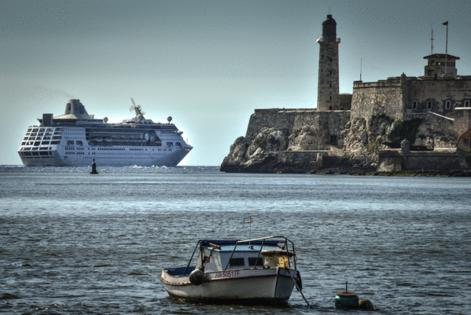In a first, Supreme Court will hear 2 cases involving confiscated property in Cuba
Published in Political News
In a significant development that comes six decades after Fidel Castro’s government seized all private property in Cuba, the U.S. Supreme Court has agreed to hear two cases involving lawsuits against Cuban companies and four major Florida-based cruise lines accused of trafficking in confiscated property.
In a brief, unsigned order on Friday, the Supreme Court agreed to hear cases brought by oil giant Exxon and Havana Docks — a company that had a concession to Havana port facilities — related to the 1996 Libertad Act, also known as the Helms-Burton Act. A provision in that law allows U.S. nationals who hold a claim to property that the Cuban government confiscated without compensation to seek damages from companies that have profited or “trafficked” in such property.
A ruling supporting Exxon and Havana Docks could remove significant hurdles and ease the legal pathway for similar lawsuits at a time when the Trump administration is seeking to increase pressure on the Cuban government.
From 1996 to 2019, successive U.S. presidents suspended the Helms-Burton provision that provided the legal remedy — known as Title III —out of diplomatic concerns, as several U.S. allies, including Canada and Spain, have investments in Cuba. But in 2019, President Donald Trump enacted that portion of the act during his first term. More than 40 lawsuits have been filed since.
But the law had not been tested in court, and plaintiffs have faced setbacks due to technicalities and the time lapse.
Exxon was the first American company to sue Cuban state companies, Cimex and Unión Cuba-Petróleo in 2019, for the exploitation of service stations confiscated by the Cuban government. But after years of expensive litigation, Exxon hit a roadblock last year when a Washington, D.C., federal appeals court ruled the Cuban entities could not be sued because they had foreign immunity.
In 2022, a federal judge ordered the cruise lines Carnival, MSC SA, Royal Caribbean and Norwegian to pay more than $400 million in damages to Havana Docks, the American company that had the concession to the Havana port facilities the cruise companies used to disembark passengers between 2015-19. The facilities, some of which were built by Havana Docks, had been expropriated without compensation in 1960.
But because Havana Docks had a 99-year concession for the use of the port piers and facilities, which expired in 2004, the Atlanta-based 11th Circuit Court of Appeals struck down the judgment, arguing that the company did not have an interest in the property at the time of the alleged trafficking.
In a dissenting opinion that forms the basis for Havana Docks’s petition to the Supreme Court, appeals court Judge Andre L. Brasher cited precedent establishing that under the Helms-Burton Act, former owners of confiscated property were considered to have a claim to such property instead of any rights in the property itself.
“Unlike Havana Docks’ original concessionary interest in the docks, its claim is not time-limited,” he argued.
The Supreme Court will now decide whether the plaintiffs must prove they would have currently owned or have an interest in the property in question had it not been confiscated by the Cuban government, a view that, if sustained, would bar other claimants who hold time-limited rights like patents. And, in the case brought by Exxon, whether Cuban state companies can evade liability under the Helms-Burton Act by claiming foreign sovereign immunity.
The fact that the high court has fast-tracked the two cases, which involve a narrow foreign policy issue, instead of the high profile cases of national interest it usually handles, is worth noting, said John Kavulich, the president of the U.S-Cuba Trade and Economic Council, who has been tracking the Helms-Burton lawsuits.
Just the mere fact the cases got to the Supreme Court “will have an immediate impact on Cuba,” he said. “Companies again will have a reason to pause and regardless of the decision, some may even decide Cuba is not worth the effort during the Trump administration years.”
Kavulich also noted that the conservative leaning of the court, their favorable rulings for the Trump administration on several issues and the fact the Justice Department is also supporting the plaintiffs, are all unfavorable signs for the Cuban government.
“It-s not a good day for the Miguel Díaz-Canel administration,” he said.
Foreign policy might be central to the Supreme Court deliberations.
Havana Docks’ petition, co-written by Christopher Landau, currently the U.S. deputy secretary of state, argues that the appeals court undermined “a pillar of U.S. economic sanctions against Cuba… usurped the role of the political branches, and overrode their policy choices.”
In a filing supporting Havana Docks, five members of Congress from Florida – Sen. Rick Scott and Reps. Mario Díaz-Balart, Debbie Wasserman Schultz, María Elvira Salazar and Carlos Giménez – wrote that “the judgment sought to be reviewed upends the Libertad Act and undermines our nation’s foreign policy on Cuba.”
The Trump administration also strongly supported Exxon and Havana Docks’ requests, telling the Supreme Court it is in the interest of U.S. foreign policy to review the cases.
“The United States has compelling foreign-policy interests in ensuring that U.S. nationals whose assets were illegally expropriated by Fidel Castro’s communist regime receive recompense and in preventing the Cuban government from further benefiting from its wrongdoing,” the Justice Department said in a filing to the court supporting Exxon. “Review is especially warranted now, during a window when the President has allowed Title III suits to proceed, and at a time when the United States believes that such suits could meaningfully contribute to American foreign-policy objectives involving Cuba.”
_____
©2025 Miami Herald. Visit miamiherald.com. Distributed by Tribune Content Agency, LLC.
























































Comments